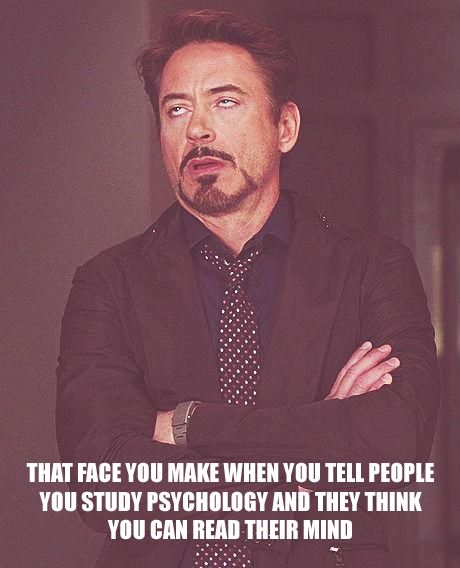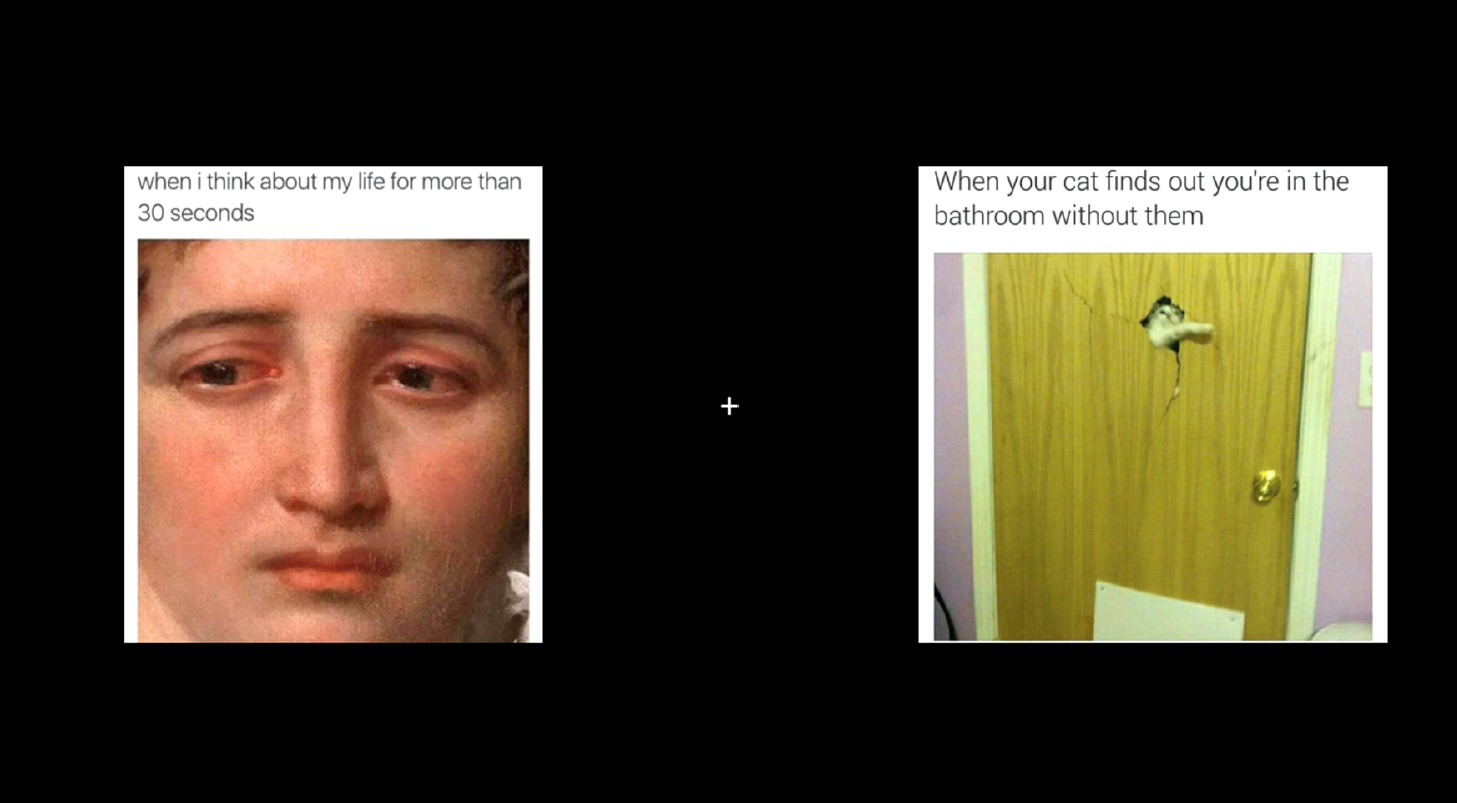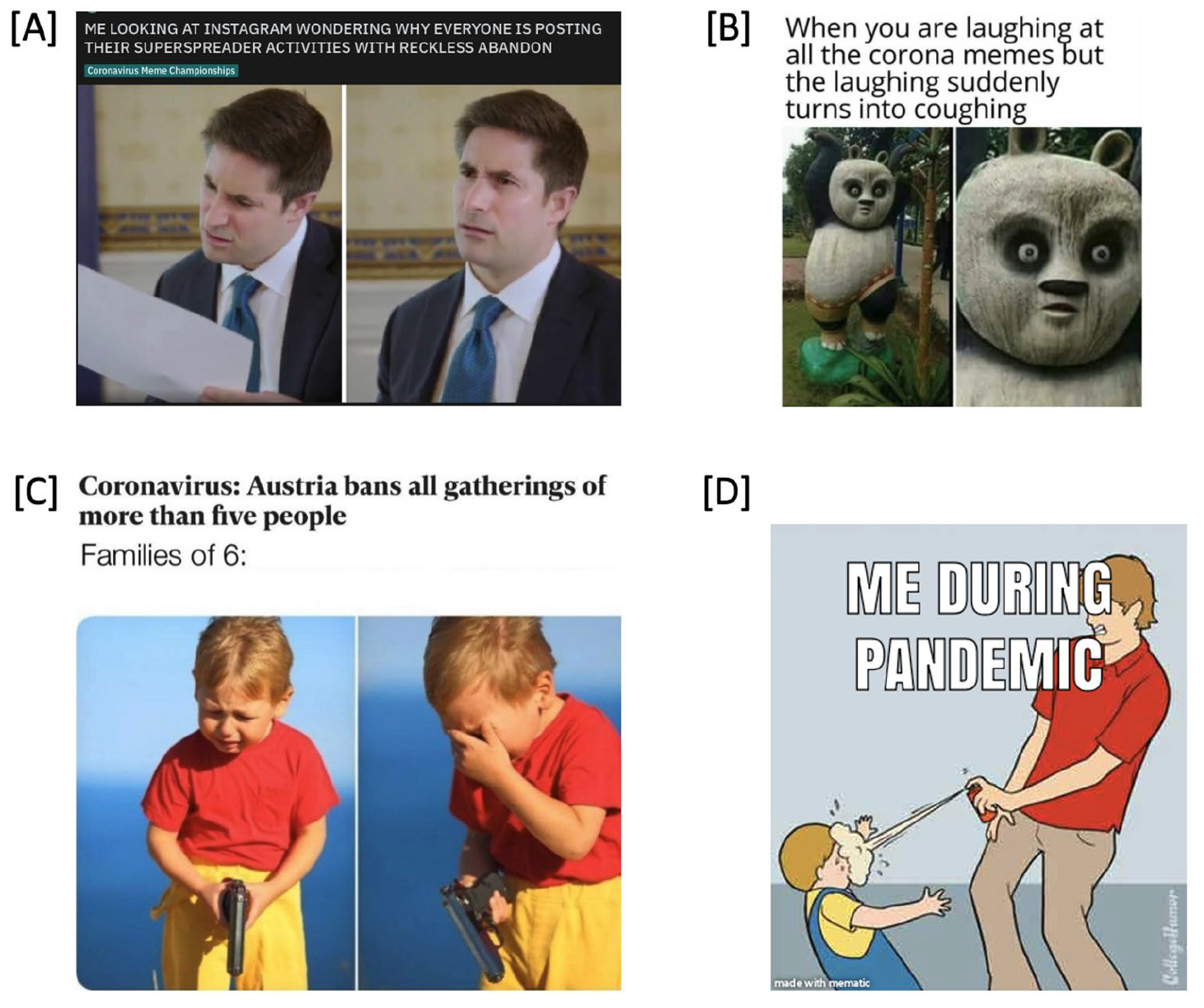Possible benefits of internet memes related to the symptom experience of psychiatric difficulties
Published in Behavioural Sciences & Psychology

What are Internet memes?
Evolutionary biologist Richard Dawkins (1976) first introduced the term meme, based on the notion that individuals creatively manipulate pre-existing stimuli to the extent where it is mutated and subsequently spread through derivatives. Here, memes were compared to biological genes as both transfer information between individuals while also transmitting and spreading though derivatives. Preceding the internet era, memes were conceptualized as ideas, behaviours, skills, verbal phrases, and fashion styles communicated either: visually; verbally; or electronically. While conceptually like traditional memes, contemporary internet memes visually depict an element of a culture or behavioural system, in a humorous way that contextually relates to a particular demographic. Contemporary internet memes are comprised of an image paired with a short caption related to the topic at hand, which are rapidly shared, usually with slight variations of the original.

Memes with a psychiatric focus
Internet memes related to psychiatric difficulties generally encompass an image and short caption both directly related to the symptom and situational experience of the condition. These memes are largely negative and emotional in nature. For example, memes pertaining to major depressive disorder often depict themes related to death, suicide, and social isolation. That said, depression-related (or depressive memes) memes are typically poised in a self-defeating and humorous way, with the intent of eliciting a degree of relatability in the target audience. Indeed, many social media pages, groups and online forums are dedicated to memes associated with psychiatric symptoms. The Reddit forum (r/depressionmemes) has approximately forty thousand users, whilst or Facebook’s ‘memes to discuss in therapy’ page is followed by approximately half a million people. Despite being highly prevalent, empirical examination of how psychiatric symptoms may influence, or be influenced by, the interpretation of affective internet memes related to the symptom experience of conditions (e.g., anxiety, depression) remains sparse.

Internet memes related to psychiatric symptoms are an increasingly popular and unique subculture in the context of social media with many creative individuals dedicating their time by consistently updating the online meme content to follow popular culture and trending topics. This dedication maintains the popularity of memes while accomplishing the end goal of memes: to provide humorous social commentaries, which are contextually relevant to a specific target population.
Evidenced based research
Depression memes
Published in Scientific Reports, our first study compared perceptual differences between subclinical depressed and non-depressed individuals in how they interpret a series of depressive memes across several parameters involving ratings of:
- Perceived humour.
- Relatability.
- Shareability (i.e., likelihood of sharing the observed meme with another).
- Mood improving potential (i.e., the extent that the observed meme would make a person with depression feel good).
- Perceived valance (i.e., the extent each meme was considered to be positive/negative).
As one of the first studies of this nature, no pre-existing, validated, set of depression memes were available for use. As such, pictorial memes relating to depression were obtained from an online google image search using keywords such as ‘depression’, ‘depressive’, ‘humorous’, ‘everyday’, ‘social’ and ‘memes’. Here, we identified two sets of memes with sixteen containing affective content relating to the experience of depression, and a further sixteen reflecting generally humorous social commentaries for use as control memes. Preliminary analyses confirmed the integrity of each subset of memes as detailed in the paper. The outcomes indicated that relative to non-depressed controls, depressed individuals reported increased ratings of humour, relatability, shareability and mood improvement potential of depression memes when compared with control memes. However, these differences in interpretation were mediated by limitations in the ability to deploy adaptive emotion regulation strategies. These results have since been replicated amongst a different sample, with the additional outcome that self-defeating humour (i.e. excessive self-disparaging humour; amusing others at one’s own expense to facilitate integration or gain approval; allowing oneself to be the focus of others’ humour) influenced the extent to which depressed individuals might prefer depressive memes.
Although memes related to depression present a dark and negative humour style, their proximal nature to those experiencing psychiatric symptoms may be considered contextually positive. Together, these studies highlight potential therapeutic benefits for individuals experiencing sychiatric difficulties. Specifically, by:
- Facilitating a humorous take on a negative experience and situation.
- Perception of peer-support through affiliation with others experiencing similar symptoms.
- Providing a visual outlet for the experience and encumbering nature of depressive symptoms, which for many may be difficult to verbalise.
Moving forward, published in Experimental Brain Research, we sought to objectively explore how this population observe depressive (relative to generally humorous) memes. Here, we recorded the eye movements of individuals presenting clinically significant symptoms of depression and healthy controls whilst they observed a series of meme pairs as part of a visual attention task.The results evidenced the depressed group orient their initial gaze more rapidly towards depressive (relative to neutral) memes whilst spending more time observing these memes. Consequently, it appears the attention of individuals with depressive symptoms is more easily captured by memes related to depression, with less interested placed in generally humorous memes unrelated to their symptom experience.

Example trial from study (Experimental Brain research, 239, 575–581: 2021) presenting depressive (left) and control (right) meme-pair used for visual attention task. Of note, the crosshair disappeared on the appearance images and is presented in the current context to highlight the centre point. Images were collected from the public domain and were not modified. They were marked with the Public Domain Mark 1.0 or CC0 1.0 Universal licence. Title and Artist: Unidentified. Image source: snappygoat
COVID Memes
To prevent the initial spread of the ongoing COVID-19 pandemic, many governments worldwide enforced several health-related measures (i.e., promoting social distancing and face masks, quarantining, applying curfews, and social lockdowns). Whilst necessary, many felt the strain of perceived personal infringement and a very real sense of financial uncertainty. Certainly, these factors combined with the prolonged experience of being in a worldwide pandemic, may disturb cognitive (i.e., cognitive reappraisal) and behavioural (i.e., expressive suppression) processes which serve to preserve the stability of the emotion regulation system. As a result, those with no prior or pre-existing symptoms may become vulnerable to the first onset of psychiatric difficulties, whereas symptom exacerbation may present amongst those already suffering from such difficulties. Indeed, the population prevalence of common psychiatric symptoms has increased exponentially since the start of the pandemic. For example, an approximate twofold increase in clinically significant symptoms of anxiety and depression have been observed in many countries.
Accordingly, social media pages, groups and forums quickly became dedicated to the observation and sharing of internet memes related to various aspects of the pandemic. Reddit became a particularly favourable source filled with subreddits dedicated to such memes (e.g., r/Coronavirusmemes), with some holding periodic ‘Coronavirus Meme Championships’. As many individuals turned to the internet and social media to pass the time during the initial prolonged lockdown, we explored whether memes related to the COVID-19 pandemic may be a coping mechanism for individuals experiencing clinically significant anxiety.
In this study, anxious and non anxious controls observed a series of forty-five most upvoted memes gathered from the /Coronavirusmemes subreddit. Each meme was rated in terms of their:
- Perceived valance (i.e., the extent each meme was considered to be positive/negative).
- Perceived humour.
- Personal relatability.
- Shareability (i.e., likelihood of sharing the observed meme with another).
- Offensivness.

Four examples (A–D) of COVID-19 internet memes. All images used were gathered from the public domain each marked with either the Public Domain Mark 1.0 or CC0 1.0 Universal licence. No alterations were made. Title and Artist: Unknown. Image Source: Snappygoat.
Are there any negative effects of psychiatric memes?
Unsubstantiated claims often suggest that internet memes related to psychiatric symptoms visually depict and promote aversive behaviour (e.g., self harm), leading to an exacerbation of symptoms. Whilst concerns about such memes are understandable, recent social media analysis of images tagged as self-harm failed to demonstrate encouragement of such behaviour in other people. Crucially, self-harming behaviour were only illustrated in personal posts only, rather than depression related memes . Furthermore, API data of instagram posts found only 2% of approximately three million posts disclosing mental health difficulties to include any explicitly graphic images, of which non were formatted as a meme. Finally, when gathering memes from Reddit to use in our research studies, we failed to note any encouragement of adverse behaviour amongst the most upvoted memes related to anxiety and depression.
The role of humour and emotion regulation
Moving forward
Next, we aim to explore how internet memes related to psychiatric symptoms are perceived in populations other than those experiencing anxiety and depression pairing more experimental and qualitative methods. In addition, further research and replication is required to substantiate existing data. Ultimately, the long-term goal is to explore how memes related to specific psychiatric symptoms may be incorporated into a therapeutic setting. Anecdotally, feedback from clinicians have indicated using memes as an ice-breaker in therapy, and patients using memes to visually indicate their emotional state, general mood and/or experience of the week. You can read a methodological evaluation of the literature to date here, where we provide suggestions moving forward.
Concluding remarks
Social media pages dedicated to memes related to psychiatric symptoms appear to facilitate the expression of difficult emotions in a novel and creative way. These memes are well received in those with experiencing symptoms of anxiety and depression. More importantly, interacting with psychiatric memes may present potential benefits for those struggling with their symptoms. More specifically, individuals report using memes to alleviate their symptoms and laugh at their problems while forming social connections with those in the same situation. Moreover, for those experiencing co-occurring difficulties in emotion regulation, internet memes may serve to potentiate cognitive reappraisal.
For further insight, read the full work here
-
Akram, U., Drabble, J., Cau, G. et al. Exploratory study on the role of emotion regulation in perceived valence, humour, and beneficial use of depressive internet memes in depression. Sci Rep 10, 899 (2020). https://doi.org/10.1038/s41598-020-57953-4
- Akram, U., Irvine, K., Allen, S.F. et al. Internet memes related to the COVID-19 pandemic as a potential coping mechanism for anxiety. Sci Rep 11, 22305 (2021). https://doi.org/10.1038/s41598-021-00857-8
- Akram, U., Ellis, J.G., Cau, G. et al. Eye tracking and attentional bias for depressive internet memes in depression. Exp Brain Res 239, 575–581 (2021). https://doi.org/10.1007/s00221-020-06001-8
Follow the Topic
-
Scientific Reports

An open access journal publishing original research from across all areas of the natural sciences, psychology, medicine and engineering.
Your space to connect: The Psychedelics Hub
A new Communities’ space to connect, collaborate, and explore research on Psychotherapy, Clinical Psychology, and Neuroscience!
Continue reading announcementRelated Collections
With Collections, you can get published faster and increase your visibility.
Reproductive Health
Publishing Model: Hybrid
Deadline: Mar 30, 2026
Women’s Health
Publishing Model: Open Access
Deadline: Feb 28, 2026






Please sign in or register for FREE
If you are a registered user on Research Communities by Springer Nature, please sign in